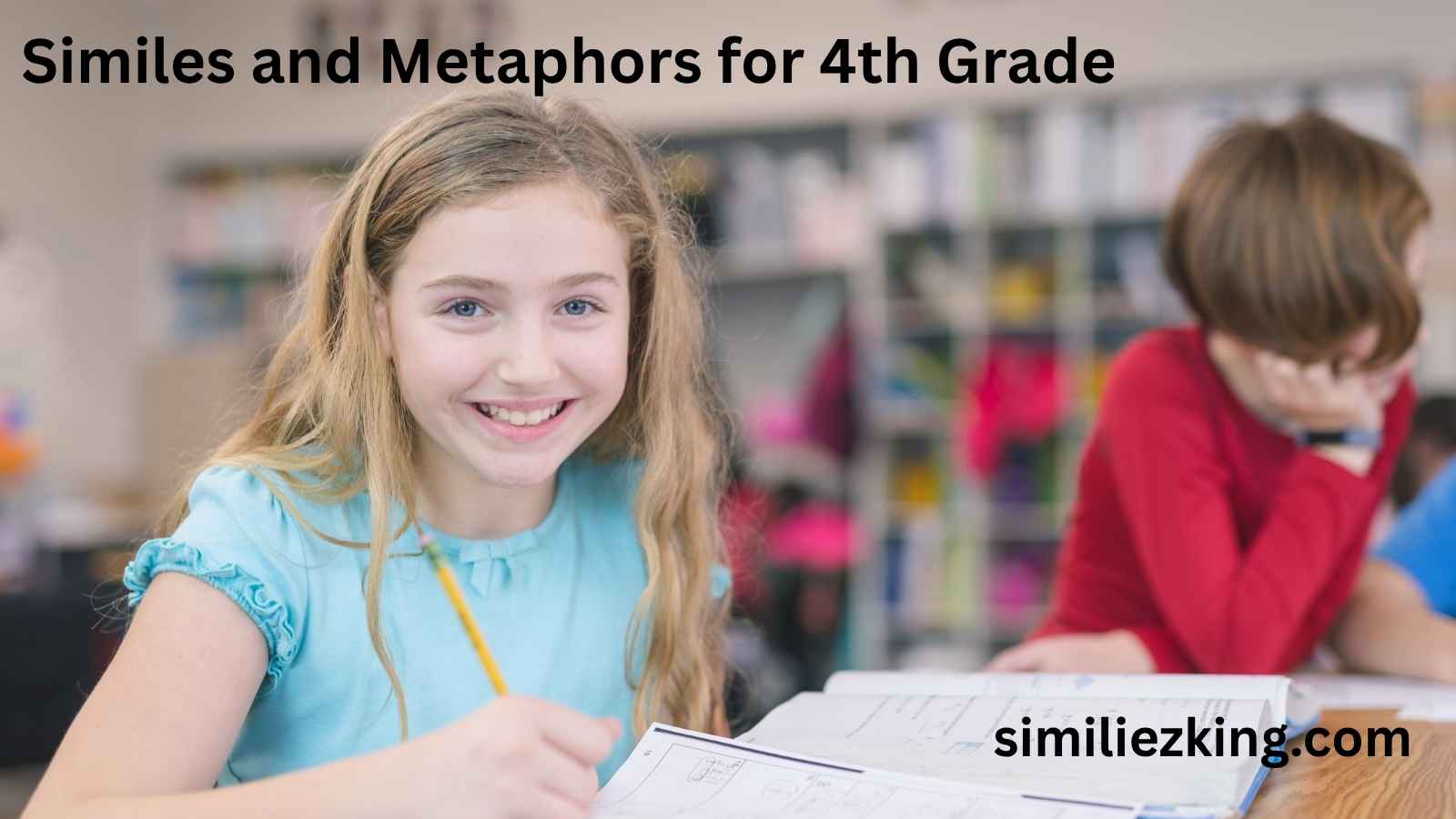Figurative language adds color and depth to our communication, making it more vivid and expressive. For 4th-grade students, understanding similes and metaphors is a crucial step in enhancing their reading and writing skills. This guide aims to demystify these concepts, providing clear definitions, examples, and practical applications to make learning both effective and enjoyable.
Understanding Similes and Metaphors
What is a Simile?
A simile is a figure of speech that compares two different things using the words “like” or “as.” It highlights similarities between two concepts, making descriptions more vivid.K5 Learning+3IXL Learning+3IXL Learning+3
Examples:
- Her smile was as bright as the sun.
- He runs like a cheetah.YouTube+9IXL Learning+9IXL Learning+9IXL Learning+1YouTube+1
What is a Metaphor?
A metaphor directly compares two unrelated things by stating that one is the other, without using “like” or “as.” It implies a symbolic resemblance between the two.K5 Learning+3IXL Learning+3IXL Learning+3
Examples:
- Time is a thief.
- The classroom was a zoo.Kirsten’s Kaboodle+2HelloSubs main+2Kirsten’s Kaboodle+2
The Importance of Figurative Language in 4th Grade
Introducing similes and metaphors at the 4th-grade level enhances students’ linguistic abilities by:
- Enhancing Creativity: Encouraging imaginative thinking and expression.
- Improving Comprehension: Aiding in the understanding of complex texts.
- Enriching Vocabulary: Expanding the range of descriptive words and phrases.
- Boosting Writing Skills: Enabling more engaging and expressive writing.HelloSubs main
20+ Engaging Similes for 4th Graders
Similes can be themed to align with students’ interests, making them more relatable and easier to understand.
Animal-Themed Similes
- As brave as a lion.
- As sly as a fox.
- As busy as a bee.
- As quiet as a mouse.
- As fast as a cheetah.Kirsten’s Kaboodle+3YourDictionary+3sofatutor.com+3sofatutor.com+1IXL Learning+1
Nature-Themed Similes
- As bright as the sun.
- As cool as a cucumber.
- As fresh as a daisy.
- As light as a feather.
- As clear as crystal.
Food-Themed Similes
- As sweet as honey.
- As sour as a lemon.
- As hot as chili.
- As smooth as butter.
- As flaky as a croissant.
Everyday Similes
- As sharp as a tack.
- As flat as a pancake.
- As tall as a giraffe.
- As cold as ice.
- As slow as a snail.YourDictionary+13BYJU’S+13Teachers Pay Teachers+13Kirsten’s Kaboodle
20+ Creative Metaphors for 4th Graders
Metaphors offer a direct comparison, enriching language with deeper meaning.Literacy Minnesota
Animal-Themed Metaphors
- He is a night owl.
- She has eagle eyes.
- They are a pack of wolves.
- He is a lone wolf.
- She is a butterfly in the garden.sofatutor.com
Nature-Themed Metaphors
- The world is a stage.
- Time is a river.
- The sun is a golden ball.
- The wind is a whisper.
- The stars are diamonds in the sky.HelloSubs main
Food-Themed Metaphors
- He is a couch potato.
- She has a heart of gold.
- Their plan is half-baked.
- He is the apple of my eye.
- Her words are honey.HelloSubs main
Everyday Metaphors
- Life is a journey.
- His mind is a computer.
- She is a shining star.
- The classroom was a zoo.
- He has a heart of stone.Literacy Minnesota+4HelloSubs main+4Kirsten’s Kaboodle+4
Polite, Professional, and Casual Alternatives to “Similes and Metaphors for 4th Grade”
Depending on the context, various phrases can be used to refer to similes and metaphors suitable for 4th-grade students.
Polite Alternatives
- Figurative Language Examples for Young Learners
- Creative Comparisons for Elementary Students
- Descriptive Language Tools for ChildrenKirsten’s Kaboodle+2HelloSubs main+2Kirsten’s Kaboodle+2
Professional Alternatives
- Figurative Language Curriculum for Grade 4
- Educational Resources on Similes and Metaphors
- Language Arts Materials for Elementary EducationTeachers Pay Teachers
Casual Alternatives
- Fun Language Comparisons for Kids
- Cool Ways to Describe Things
- Imaginative Expressions for 4th GradersHelloSubs main
Texting Examples: User-Friendly and Optimized for Google
Incorporating similes and metaphors into texting can make messages more expressive.
- Simile: “I’m as hungry as a bear after hibernation!”
- Metaphor: “You’re a rockstar for helping me with homework!”
- Simile: “This movie is as boring as watching paint dry.”
- Metaphor: “My phone is my lifeline.”
- Simile: “He’s as fast as lightning on the soccer field.”sofatutor.com
Choosing the Right Expression Based on Context and Tone
Selecting the appropriate simile or metaphor depends on the situation and the desired tone.
- Formal Contexts: Use metaphors to convey complex ideas succinctly.
- Example: “Time is a valuable resource.”
- Example: “Time is a valuable resource.”
- Informal Contexts: Similes can add humor and relatability.
- Example: “He’s as funny as a stand-up comedian.”Literacy Minnesota
- Example: “He’s as funny as a stand-up comedian.”Literacy Minnesota
- Educational Settings: Choose age-appropriate and relatable comparisons.
- Example: “Learning is a journey, not a race.”YouTube+2YouTube+2Udemy Blog+2THE CLASSROOM NOOK+2Teachers Pay Teachers+2HelloSubs main+2
- Example: “Learning is a journey, not a race.”YouTube+2YouTube+2Udemy Blog+2THE CLASSROOM NOOK+2Teachers Pay Teachers+2HelloSubs main+2
Conclusion
Understanding and using similes and metaphors enriches language skills, making communication more engaging and effective. For 4th-grade students, mastering these figures of speech opens doors to creative expression and deeper comprehension. By exploring themed examples and learning to choose the right expressions based on context and tone, young learners can enhance their linguistic abilities in a fun and meaningful way.



